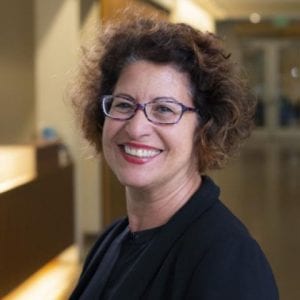News Roundup – Haas Launches Deferred Admissions, Tuck MBAs Attend Climate Conference, and More

Let’s take a look at some of the biggest stories from this week, including UC Berkeley admissions deferment for its MBA program.
Haas Launches Deferred MBA Admissions Program – Berkeley Haas Newsroom
The Haas School of Business at UC Berkeley has announced a new program, Accelerated Access, which allows graduate and undergraduate students to defer MBA admission in order to obtain work experience.
Launching January 22, 2020, Accelerated Access will at first only be open to students in their final year of study, but UC plans to expand the program to include all students across the university system. Applicants who are accepted will gain conditional admission with a two to five year deferment period.
Morgan Bernstein, Director of Strategic Initiatives at Haas, says, “Accelerated Access is an innovative way for students to secure a seat in our MBA program, providing a way for them to pursue full-time work that aligns with their passions, with reassurance that they will be able to return to a top-ranked MBA program in a few years…We have so much talent here in the Berkeley community—and this is another way that we are cultivating and committing to that talent.”
The goal of Accelerated Access is to open admission to students who may not have previously considered pursuing an MBA due to a lack of professional experience.
The opening year of the program has two application deadlines: Thursday, April 2, 2020 and Thursday, June 11, 2020. The application process has similar requirements as the regular MBA program, with one notable difference. Haas has waived the $200 application fee for Accelerated Access students. In addition, qualified applicants will be eligible for up to five scholarships worth $100,000.
Read here for more on Accelerated Access and UC Berkeley admissions.
At COP25, Tuck Has a Front-Row Seat – Tuck School of Business News
A delegation of ten Dartmouth Tuck School of Business students attended the United Nations’ COP25 conference in Madrid last December. Led by Professor Tracy Bach, the delegation was able to observe climate change negotiations in action.

One delegate, Melena Sanchez Montanes, (T, 20), is the Director of the Tuck Social Venture Fund. She says of COP25, “It was very energizing to see all these young people committed to finding solutions to climate change and an amazing experience to see the negotiators working live on behalf of their countries and hearing what’s important to them.”
Tuck’s Revers Center for Energy and the Center for Business, Government & Society each had a hand in sending the delegation. It is one of numerous experiential opportunities offered to Tuck students interested in sustainability, impact investing, and energy innovation. Tuck offers electives devoted to the business of climate change and to leadership in the new global economy.
Another Tuck delegate Kevin Yuan (T, ’20), recently accepted a position with Nike as global manager of sustainability. He became connected with the brand at a previous COP conference in Poland, and his new position will allow him to work on such projects as seeking ways to offset Nike’s carbon footprint.
Yuan says:
“The climate crisis can seem like this huge problem, where we don’t even know where to start, and it can feel defeating and deafening. But if you find your sliver of the pie and give it everything you can give, the world will be in a better place … As the world’s largest apparel company, Nike is a bellwether, and I feel uniquely empowered to impact climate change because of Nike’s global presence.”
For more on the delegation and COP25, read here.
How I Got the Job: Program Manager II, Twitter – Vanderbilt Owen News & Events
Shanah Gaskill, a current MBA at Vanderbilt University’s Owen Graduate School of Management, recently shared the experience of her application, interview and hiring process as a Program Manager at Twitter.
Her story is part of the school’s “How I Got the Job” series. Gaskill began her career in marketing at Uber, where she eventually became a Senior Marketing Manager. There, she discovered her yen for ‘people-centered’ projects. Gaskill’s desire to use these skills prompted her to consider a future in HR, in addition to pursuing an MBA. This decision led Gaskill to the Owen MBA, which offers a concentration in Human and Organizational Performance (HOP).
“Coming to get my MBA, specifically at a school that was focused on HR, would allow me to make the jump. In [Twitter’s] interview process, being able to speak to what I was learning in class was super cool. What we learned in the HOP classes are very applicable to the HR roles that we’re going into,” Gaskill says.
Her success in the interview process won her a summer internship at Twitter, which has led to a full-time position as a Program Manager on their Global Talent Management Team. Of her new position, Gaskill adds, “I’m just really excited to work with and learn from my colleagues … They just pour so much into their employees that everyone there is so proud to work there … everyone is [dedicated to] the same mission.”
Read here for more on Gaskill’s MBA experience at Owen, including a helpful timeline of events that led her to Twitter.
World’s Leading Behavioral Science Conference Comes to the University of Toronto’s Rotman School of Management – Rotman News Releases
The University of Toronto Rotman School of Management‘s Behavioral Economics in Action at Rotman (BEAR) research center will host a global conference on behavioral science on July 13 and 14, 2020.

Behavioral Exchange 2020 (BX2020) brings together industry, academic, and government experts to explore innovations in the field of behavioral innovations. The conference’s 500 delegates will share their expertise in the areas of public health, diversity and inclusion, global finance, and sustainability as each pertains to human behavioral science.
Click here to learn more about the upcoming event.
Critical FAQs About the Cornell Tech MBA

What is the Cornell Tech MBA program? How do you know if it’s the right program for you? Recently, Adam Gavish, a Cornell Tech MBA alum, wrote about his experience and shared his opinions on LinkedIn. Here’s what he had to say.
What Makes the Cornell Tech MBA Different?
There are four key elements that make the CT MBA different than other programs.

- The Tech Industry: In this MBA program, you’ll get close to the tech industry, meeting and learning from hundreds of industry professionals. You’ll also dive into real-life experiences and learn tools from the tech industry.
- Hands-On Experience: As a Cornell Tech MBA, you’ll design mock UIs, implement proof-of-concept prototypes, conduct user research, explore product ideas, and more.
- Cross-Disciplinary Collabs: You’ll work with students from multiple MBA programs, computer science programs, and more to solve problems.
- Entrepreneurial Focus: From learning how to be a better public speaker to exploring customer empathy, you’ll gain entrepreneurial skills throughout the program.
Where Do Alumni Work?
After graduating with your Cornell Tech MBA, what type of job can you expect? According to Gavish, the program is best for product managers, whether at big or small companies. Alumni go on to work for a wide range of companies including Amazon, BlackRock, eBay, Google, MasterCard, Microsoft, Twitter, the Wall Street Journal, and more.
That doesn’t mean you can’t pursue a career in consulting, sales, or operations with a CT MBA, but you’ll gain the most experience in product management.
What About Post-MBA Recruiting?
When you graduate with a Cornell Tech MBA, you can rest easy knowing that you’ll have plenty of recruiting opportunities. Since the campus is located in New York City, you’ll have physical access to thousands of big tech companies and startups. You’ll also have access to the Cornell network, which is massive and incredibly helpful and giving. Last, but certainly not least, the CT Career Management Center is very well connected.
Risks of a One-Year MBA?
However, if you do decide to pursue the CT MBA, there are a few things to keep in mind.
- There is no summer internship, which can be negative for individuals who have never worked in the tech industry before and need extra experience.
- There’s also very little time to think about your post-MBA career during the program, so you have to plan and plan well.
- When you’re trying to cram full-time learning and course work into just 12 months, you can expect a lot of stress and hard deadlines.
See all that Adam Gavish had to say by checking out his post, here.
This article has been edited and republished with permissions from its original source, Clear Admit.
5 Questions With UC Davis MBA Admissions Senior Director Andrea Shaw

In our latest installment of the MetroMBA “5 Questions” series, we speak with Andrea Shaw, Senior Director of Admissions at the UC Davis Graduate School of Management. Shaw discusses the tight-knit culture of the UC Davis MBA program, what students can expect, and what qualities define the program.
How does UC Davis help MBA applicants who don’t come from a traditional business or quantitative background?
“Students come to us from across industries, functions, and from around the world. We pride ourselves on being a tight-knit and collaborative community where conversations directly happen between faculty, staff, and students. Our curriculum also allows students to choose between many different career paths especially given the connections we have across other UC Davis schools.
For students coming from a non-business background or who are nervous about starting, we’re a school that really fits. Many schools have 600 students in a full-time program. We only have 50 students. That allows us to personalize the journey of each student.
Also, UC Davis doesn’t believe in just throwing our students into the program. We get to know our students and their needs—what they’re looking for, their strengths, weaknesses, etc. Part of that knowledge comes from our highly robust orientation where we spend almost a month before school starts to really engage with our students.

Andrea Shaw, Senior Director of UC Davis Graduate School of Management Admissions
During orientation, we spend a tremendous amount of time learning about our MBA class. There’s a significant career focus with discussion topics focused on networking, resume building, LinkedIn, etc. However, what the orientation is most known for is helping our students understand their emotional intelligence and develop their story through exercises and experiential learning.
Students have said in surveys that it’s the orientation that solidifies that they’ve made the right decision to come here. Those first few weeks are critical for setting them up for success.”
What type of culture defines UC Davis?
“The two words that continually come up from students, alumni, and faculty are “kind and compassionate.” We are driven toward success, but nice. It’s the idea of compassionate leadership, which research has shown to be necessary for true business growth. We even have an entire series that students can take to develop these skills, including awareness of themselves and others. Kindness and compassion are woven into every aspect of our culture, starting at the top with our dean.
Our culture is also defined by our location in a college town instead of a city. I love Davis as a city, community, and a place to go to college. It’s safe, comfortable, and all the energy revolves around the college.
We’re also really focused on what we do best as a university—biotechnology, sustainability, agriculture. Those sorts of segments and industries are very tied to our culture, university, and research. So, someone interested in Wall Street finance might not fit as well as someone interested in biotech.
Finally, because we’re a small community, you can really stand out. There are not a lot of politics to hold you back. You can get very involved, and there are fewer people vying for the same positions, so you can do as much as you want. This is highly beneficial for students who have a particular passion that they want to explore. For example, I know an MBA student who started a Women in Leadership organization because that was something she was passionate about, and it happened in a few conversations.”
Can you describe the qualities that UC Davis students possess?
“Other than the typical GMAT scores, GPA, and years of work experience, we look for applicants who know what they want to do with their MBA. Candidates should have a focus for the post-MBA career while also remaining open-minded about new opportunities. After all, an MBA is meant to be a transformative experience.
We also look for highly competent individuals who are professional in their verbal and written communications with us. We pride ourselves on being able to find jobs for all our students, so there’s a benchmark we look for—well-rounded students that have many different qualities. Going back to this idea of collaborative and kind, we look for candidates who are good team players and who see the value of working in groups because we have a lot of group work.
Finally, we look holistically at the class and how everyone will learn from each other. We look for a diverse class with students from a wide variety of backgrounds and industries. Everyone should be unique while still representing the essential qualities we love: kindness, compassion, and collaboration.”
If you could give one piece of advice to an MBA applicant interested in UC Davis, what would it be?
“Confidence! So much of what MBAs lack is confidence. The problem is that if you don’t think you can succeed, you won’t.
When you fill out your application and come in for your interview, we want confidence. Confidence is doing your research (knowing UC Davis), knowing who you are, and knowing your story. It’s also about being authentic. All of that leads to being confident in who you are and what you want. That will come across with us; it will come across anywhere.

“Confidence! So much of what MBAs lack is confidence. The problem is that if you don’t think you can succeed, you won’t,” Shaw says.
Remember, first impressions matter. That’s where that confidence helps too. If you come into a situation confidently, those first impressions are strong.”
What is your favorite San Francisco-focused business blog/website?
“I would say for applicants who are looking at schools in the Davis area, Metro-Edge.org is an excellent website. This is a website for young professionals in the Sacramento area. You’ll find events, gatherings, news, and more. It’s really focused on change and responsibility, and that’s great.
I also have to give a little plug to all of our social media accounts. Follow us on LinkedIn, Twitter, and Facebook for the latest news and insights. We also have MBA Showcase days coming up on January 26, February 9, and Feb 23.”
USC Marshall Honored with Two Telly Awards, and More – Los Angeles News

Check out some of the top news stories coming out of the Los Angeles metro this week, including USC Marshall earning a pair of Telly Awards for its Online MBA program.
The Taos Institute Recognizes Dr. Gary Mangiofico as the 2018 Honorary Associate – Graziadio Business School Newsroom
Dr. Gary Mangiofico, Executive Professor of Organization Theory and Management at the Pepperdine University Graziadio Business School, was recently honored by the Taos Institute as a 2018 Honorary Associate for his contributions to the field. An international network of scholars, the Taos Institute is dedicated to exploring the way social theory and language overlap in the professional space. Honorary Associates like Dr. Mangiofico are selected based on work the institute believes has impacted and advanced their overall mission and ideals.

Dr. Mangiofico / Photo via bschool.pepperdine.edu
A faculty member at Graziadio since 2003, Dr. Mangiofico has been an important figure in the organizational development field. In addition to his educational experience, Mangiofico has more than 20 years of professional experience, having worked as a CEO, COO, consultant, and general management executive for a variety of companies.
You can read more about the Taos Institute and Dr. Mangiofico’s work here.
Using Twitter for Product Launches: Mihaylo Management Professor Jennifer Chandler Examines Video Game Console Launches – Mihaylo Newsroom
New research from the faculty at the Mihaylo College of Business at the California State University, Fullerton, looks at important trends in business and society. Associate Professor of Management and Director of Mihaylo Graduate Programs, Jennifer Chandler, and Assistant Professor of Marketing Yuna Kim, recently looked at how Twitter factors in to the launches of new products, focusing particularly on the launch of new game consoles like PlayStation 4 and Xbox One.
By studying the language used on social media, Mihaylo faculty hope to create a standard for how company managers and marketers can use these platforms for an unprecedented connection between consumers and the products they love.
“In today’s society, consumers have a louder voice because of social media,” Chandler comments. “[A]nd when it comes to new products, this voice is crucial because everyone has the social media platform to amplify his or her opinion.”
You can check out more from Chandler’s study here.
Taking Home Two Tellys – USC Marshall News
The Online MBA program at USC’s Marshall School of Business was honored at the 39th Annual Telly Awards this past month, taking home two separate top prizes. Since 1979, the Telly Awards have honored “excellence in video and television across all screens.”
Each year, the awards receive over 12,000 entries from across the country and world. This year, Marshall’s Online MBA program was honored in the education category for their “Approaches to Strategy” series and “Approaches to Strategy: The Cold War” module.
USC’s Online MBA program has been honored multiple times by the Telly Awards already, despite being around for only three years so far. In 2016, the program won two bronze awards for the “Big Ideas in Economics” modules. Sandra Chrystal, Vice Dean for Online Education and Professor of Clinical Business Communication, commented on the program’s success.
“Everyone at Marshall shares the goal of quality online programs,” Chrystal said in a press release from the business school. “We are very proud of this recognition.”
You can read more about the USC’s Online MBA program here.
MIT on the Problems with Twitter, and More – Boston News

Let’s explore some of the most interesting stories that have emerged from Boston business schools this week.
Marketers Take Note: When Too Many Choices are a Burden, Not a Benefit – Questrom School of Business News
BU Questrom School of Business Ph.D. alum Sarah Whitley recently co-authored a new Journal of Consumer Research paper with Associate Professor Remi Turdel and fellow Assistant Professor Didem Kurt, in which they discovered “that people typically want more choices when they’re buying for pleasure [and they want] fewer choices when they make a purchase for strictly utilitarian or functional reasons.”
The research dives into what is more commonly known as the Paradox of Choice. The idea crept into the market lexicon shortly after the release of the 2004 book The Paradox of Choice – Why More Is Less from psychologist Barry Schwartz, NYU alum and U. Penn Ph.D. The general idea Schwartz derived was that consumer anxiety could be caused by too many options. However, research from Whitley, Turdel, and Kurt reveal that it may only pertain to specific kinds of purchases, not simply overall.
Whitley says the major takeaway is that businesses can be more strategic if they know “what motivates the buying decisions of their customers.”
“For product categories where people feel that they have unique preferences, it may be worth it to have more variety. It may be fine to reduce the number of offered products where this is not the case.”
You can read the full article here.
Solving Twitter’s ‘Follow-Back’ Problem – MIT Sloan Newsroom
About four years ago, MIT Sloan Associate Professor of Operations Tauhid Zaman put together a social media experiment in which he used Taylor Swift’s friends on Twitter to “open the gates to her inner circle.”

Dubbed the “follow-back problem,” Zaman sought to understand “the underlying dynamics of follows on Twitter, [such as] what kinds of Twitter interactions matter the most when trying to get followers? And do overlapping social networks actually help build connections? If they do, then to what degree do they help?”
Zaman found that Twitters “who don’t follow many other people are unlikely to follow you back, while those who follow a lot of people are likely to follow you if you follow and retweet them.” He also found that if, for instance, “Swift follows somebody who, in turn, follows Zaman, then Zaman has a greater chance that Swift will follow him.”
The article notes that social media tools can “have a tremendous blast radius” in terms of their ability to powerfully influence the opinions of a whole country.
“In my opinion, this can be far more dangerous than conventional weapons which have a fixed blast radius. These are weapons, and I’m building efficient ways to use the weapons, so this has to be handled with care,” Zaman said.
Read the full article, the first in a three-part series examining new work about Twitter, influence, and bots, here.
How CEOs Manage Time – Harvard Business Review
Harvard Business School Professors Michael E. Porter and Nitin Nohria recently published a piece in the Harvard Business Review that examines how CEOs allocate their time.
According to the article, face-to-face interactions take up “61 percent of the work time of the CEOs we studied. Another 15 percent was spent on the phone or reading and replying to written correspondence. The final 24 percent was spent on electronic communications.”
The authors describe the CEO’s job as “relentless.” They write, “Given that work could consume every hour of their lives, CEOs have to set limits so that they can preserve their health and their relationships with family and friends. To sustain the intensity of the job, CEOs need to train—just as elite athletes do. That means allocating time for health, fitness, and rest.”
You can read the full article here.
MBAs Hold High Expectations for B-School Admissions Process, Survey Finds

According to the 2018 MBA Applicant Survey conducted by the Association of International Graduate Admissions Consultants (AIGAC), MBA applicants expect a lot from business schools as they make their way through the admissions process. Not only do they want the schools themselves to be more transparent—including providing status updates, feedback, and earlier wait list decisions—they also want more consultant advice and interaction.
“More transparency in terms of the status of the application will be appreciated,” wrote one survey respondent. “Leading schools like [schools] were notoriously quiet about the application for more than 5 weeks.”
Even applicants whose bids for admission were unsuccessful want more from schools. “Feedback at some point would be fantastic,” wrote one. “At least some indication of what portion of an application was below expectation would be helpful even just for personal development.”
The latest annual AIGAC survey drew almost 2,000 responses from applicants to more than two dozen leading business schools. Results were released as part of the admissions consultant group’s annual conference, which took place last week at Northwestern’s Kellogg School of Management.
Where Do MBA Applicants Look for Admissions Information?
According to the survey results, school websites are a primary source of information for 80 percent of applicants. After school websites, online information sessions, student and alumni referrals, and admissions teams are where applicants are most likely to turn. In terms of what they are looking for, applicants are most eager for information that helps them set expectations for the admissions process, but finding it isn’t always easy. As one survey respondent said, “[School]’s application process was steeped in mystery.”
Outside of school resources, students look to social media, online communities/forums, MBA rankings, and then family/friends/work colleagues. They also look to the blogs and websites of admissions consultants as well as printed viewbooks and brochures. And many applicants look in as many places as possible to find the information they crave.
“Videos, interviews, and current or alumni experiences are very valuable,” wrote one survey respondent. Another underscored the importance of school websites being “very easy to navigate.” Online seminars that only reiterate information available on the schools’ websites are less valuable, shared another.

In the social media sphere, more applicants look to LinkedIn for information than any other channel, followed by YouTube and Facebook. Quora follows, trailed by Instagram and Twitter.

Schools That Get to Know MBA Applicants Best
Cornell’s Johnson Graduate School of Management, UVA’s Darden School of Business, and Dartmouth’s Tuck School scored the highest marks in terms of how well they get to know applicants as part of the admissions process. Notably, some of the most highly ranked business schools fell short in this regard, with Stanford Graduate School of Business and Harvard Business School bringing up the rear. As one candidate explained, “Though I fell in love with [school] during my campus visit, I felt that their application process was very impersonal, and I didn’t feel like I had enough of an opportunity to show the school who I was with a video and a [short essay] …”

Why the MBA? Why a Particular School?
The survey also sought to understand what most motivates applicants to apply to MBA programs in general. More than half—57 percent—seek to acquire new information, skills, and knowledge. Forty-nine percent, meanwhile, want access to job prospects. And 48 percent are seeking a stronger network or to advance their careers.
As for the top factors influencing which schools applicants choose to target, reputation reigns supreme, cited by 66 percent of applicants surveyed. School rank was a top factor for 61 percent, and school culture, for 53 percent.
To learn more about the survey results and to read more personal responses from applicants, consult the full survey here.
